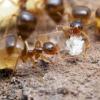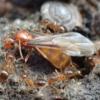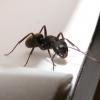- Formiculture.com
- Forums
- Gallery
- Members
- Member Map
- Chat

Camponotus in September??
Started By
ANTdrew
, Sep 10 2018 1:22 PM
13 replies to this topic
#1
 Offline
-
Posted September 10 2018 - 1:22 PM
Offline
-
Posted September 10 2018 - 1:22 PM
Hi-
My brother found a huge black queen this afternoon. From the photos he sent, it looks like a Camponotus. Is it possible to find queens of this genus this late? Or could it be some big formica? Sorry I don’t know how to post photos yet.
My brother found a huge black queen this afternoon. From the photos he sent, it looks like a Camponotus. Is it possible to find queens of this genus this late? Or could it be some big formica? Sorry I don’t know how to post photos yet.
"The ants are a people not strong, yet they prepare their meat in the summer." Prov. 30:25
Keep ordinary ants in extraordinary ways.
Keep ordinary ants in extraordinary ways.
#2
 Offline
-
Posted September 10 2018 - 2:38 PM
Offline
-
Posted September 10 2018 - 2:38 PM
Yes. I saw winged camponotus alates last week.
#3
 Offline
-
Posted September 10 2018 - 3:18 PM
Offline
-
Posted September 10 2018 - 3:18 PM
I saw a great big Camponotus pennsylvanicus alate last Wednesday, and I'm a lot farther north than yourself. So yes, it's completely possible that some species of Camponotus are still flying. It might be mostly Pennsylvanicus though - they just seem to fly whenever.
#4
 Offline
-
Posted September 10 2018 - 3:20 PM
Offline
-
Posted September 10 2018 - 3:20 PM
If you live around Maine for some reason Camponotus fly a second time around now, sometimes more so than the spring flight the rest of the US and Canada experiences.
North America: Ant Genera, Species List, "Native Plants for Honeybees" | My YouTube Channel
#5
 Offline
-
Posted September 10 2018 - 3:24 PM
Offline
-
Posted September 10 2018 - 3:24 PM
Be careful when pressing the post button, it only needs to be done once or else you will double post like you did this time. Otherwise, if you look on the home page of the forum, there is a section in the top right that is labelled Important Topics. You can find a tutorial on how to post photos on this forum. When you post your ID request, make sure you follow the proper formatting, which can be found at the top of Ant ID Requests; it's a pinned topic above all others.
#6
 Offline
-
Posted September 10 2018 - 4:29 PM
Offline
-
Posted September 10 2018 - 4:29 PM
Cool-thanks for the info. Will a queen this late need to hibernate before laying? Is she even likely to lay? I guess we’ll just have to wait and see.
"The ants are a people not strong, yet they prepare their meat in the summer." Prov. 30:25
Keep ordinary ants in extraordinary ways.
Keep ordinary ants in extraordinary ways.
#7
 Offline
-
Posted September 10 2018 - 4:32 PM
Offline
-
Posted September 10 2018 - 4:32 PM
I’m sorry. I hit post twice by accident.
"The ants are a people not strong, yet they prepare their meat in the summer." Prov. 30:25
Keep ordinary ants in extraordinary ways.
Keep ordinary ants in extraordinary ways.
#8
 Offline
-
Posted September 10 2018 - 4:37 PM
Offline
-
Posted September 10 2018 - 4:37 PM
I’m sorry. I hit post twice by accident.
It's fine, mistakes happen. No matter what queen it is, it will still be fun to raise it. I'll be waiting for the pictures to help ID it later.
#9
 Offline
-
Posted September 10 2018 - 6:35 PM
Offline
-
Posted September 10 2018 - 6:35 PM
Could just be a reject. What I mean by this is that usually queens that fail to fly during the proper time period get kicked out of the nest. The workers become tried of caring for the alate, it's quite a bit of work to do. They kick them out to help conserve food and resources, as well as the time and effort of the other members in the colony. There is the chance of an actual small flight occurring, but the chances are slim. Every Camponotus spp. nest that I have uncovered has been without alates.
Now on the other hand I did see a dealate just within the past couple of weeks. Again, the chance of a flight. But when you find out the full context of the event you will learn why it's not likely so. There was a log near my apartment complex that I discovered had many founding queen. The owners of the apartments must have decided to chop it up. The next day I find it pile in small chunks, with a dealate C. Pennsylvanicus queen walking on it. Most likely re-homing.
Now on the other hand I did see a dealate just within the past couple of weeks. Again, the chance of a flight. But when you find out the full context of the event you will learn why it's not likely so. There was a log near my apartment complex that I discovered had many founding queen. The owners of the apartments must have decided to chop it up. The next day I find it pile in small chunks, with a dealate C. Pennsylvanicus queen walking on it. Most likely re-homing.
#10
 Offline
-
Posted September 12 2018 - 6:16 PM
Offline
-
Posted September 12 2018 - 6:16 PM
Pretty sure C. pennsylvanicus is a species that flies twice a year, once in spring and again in late summer.
#11
 Offline
-
Posted September 15 2018 - 2:01 PM
Offline
-
Posted September 15 2018 - 2:01 PM
I found a P. Novaboracensis queen today! She still has her wings, though, so I’m even less optimistic than for the other one.
"The ants are a people not strong, yet they prepare their meat in the summer." Prov. 30:25
Keep ordinary ants in extraordinary ways.
Keep ordinary ants in extraordinary ways.
#12
 Offline
-
Posted September 15 2018 - 3:35 PM
Offline
-
Posted September 15 2018 - 3:35 PM
Has anyone out there caught a Camponotus queen this late and had her lay???
"The ants are a people not strong, yet they prepare their meat in the summer." Prov. 30:25
Keep ordinary ants in extraordinary ways.
Keep ordinary ants in extraordinary ways.
#13
 Offline
-
Posted September 15 2018 - 5:02 PM
Offline
-
Posted September 15 2018 - 5:02 PM
I put her in TT set up “irregardless.” I figure worst case scenario, I’m providing higher end hospice with constant humidity and honey included.
"The ants are a people not strong, yet they prepare their meat in the summer." Prov. 30:25
Keep ordinary ants in extraordinary ways.
Keep ordinary ants in extraordinary ways.
#14
 Offline
-
Posted September 25 2018 - 5:05 PM
Offline
-
Posted September 25 2018 - 5:05 PM
Checked her today and found her dead.
I hope to find one next spring.
I hope to find one next spring.
"The ants are a people not strong, yet they prepare their meat in the summer." Prov. 30:25
Keep ordinary ants in extraordinary ways.
Keep ordinary ants in extraordinary ways.
1 user(s) are reading this topic
0 members, 1 guests, 0 anonymous users



















